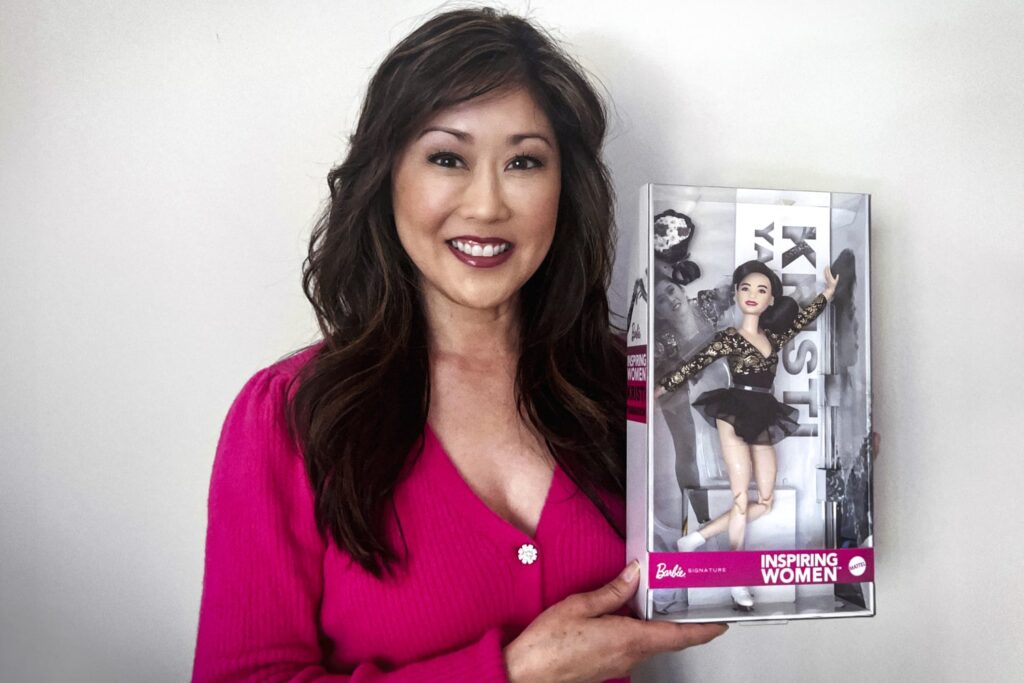Barbie pays homage to pioneering figure skater Kristi Yamaguchi with a new doll.
The release of the Yamaguchi doll, which went on sale Wednesday, coincides with the start of Asian Pacific American Heritage Month in May, according to a news release. The doll's black leotard with gold accents was inspired by Yamaguchi's outfit at the 1992 Winter Olympics, when she became the first Asian American woman to win an individual gold medal in figure skating.
“I think it's important to see representation. I think when you were growing up with Barbie dolls and playing with Barbie dolls, you really used your imagination as a child to make Barbie dolls into the people you wanted them to be. '' Yamaguchi told NBC News about getting her own doll. “If we can give them more important and impactful stories, I think that would be really great.”
This doll joins other dolls in the “Inspiring Women” line, which pays homage to history-making women such as Celia Cruz, Bessie Coleman, and Anna May Wong. Yamaguchi, a two-time world champion and Olympic Hall of Famer, said she worked with the Barbie team and sent close-up photos of the fabric and other details of her iconic costume. The results were surprisingly accurate, she said.
“The design team was really great with the shape and look of the skates, right down to the little logo,” she told NBC News. “I also had pouf hair made with bangs!”
Yamaguchi said she created a sentimental moment by revisiting her iconic dress.
“I just went to the Olympics wearing that dress. … Even at the World Championships, a month and a half after the Olympics, I wore a different dress,” she said. “That dress was specific to that gold medal performance. It's emotional in a way because it brings back all the memories of that moment.”
Yamaguchi's Olympic victory came at a time when there were few mainstream Asian American pop culture role models. Yamaguchi himself was aware that most of the previous U.S. champions in figure skating looked nothing like him, he said. However, she was drawn to certain skaters of Asian descent.
“In the early ’80s, there was Tiffany Chin, who was the first Asian American national champion,” she said. “She was one of my idols. We both shared Asian American heritage, so I think there was that connection.”
By the time Yamaguchi took home the gold medal, the Asian American community quickly welcomed her.
“When I saw how much the Asian American community supported me and was so proud of me, I thought, 'Wow, this is amazing,'” she said. “I think this reflection has definitely helped me… develop and find my own voice. It took me years to really feel comfortable being a voice for Asian Americans. .”
For a skater who came to the public's attention at the age of 20, that support was a kind of pressure.
“In general, all of a sudden I'm in the spotlight. And without knowing anything, I'm like, 'Oh my god, how am I supposed to act?' What do people want from me? What do you expect? I think that’s a little scary,” she said. “You didn't choose to be a role model, but I think you embrace that opportunity. I'm ready to embrace it and say, 'Okay, I can do some good with this.' I was there.”
However, not all of Yamaguchi's post-Olympic experiences were positive. Her victory also came at a time when anti-Japanese sentiment was rising as Japan's auto industry boomed while the U.S. auto industry was in decline. Just 10 years ago, 27-year-old Vincent Chin was murdered by two white autoworkers who mistook him for Japanese and stole his job.
And much of the media at the time touted the skater's “marketability,” she said, often speculating that her ethnicity would affect her ability to garner support.
“I didn't do this for support. But in a way, it's also a hurt feeling that maybe I'm worth less than someone else because of my ethnicity, even though I've achieved the same thing. There is,” she said.
Yamaguchi said he got over the noise by staying busy. Since her Olympic career, she has continued to support other Asian American skaters, including Olympians Alisa Liu and Karen Chen. She is an author, advocate, and founder of Always Dream, a nonprofit organization dedicated to increasing literacy among children. Mattel also announced that Barbie will be making a $25,000 donation between Yamaguchi's nonprofit and Asian Sisters Participating in Reaching Excellence, an organization focused on women's empowerment. They also announced that they would be split.

